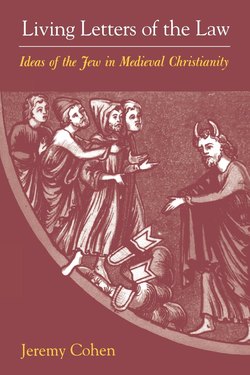Читать книгу Living Letters of the Law - Jeremy Cohen - Страница 10
На сайте Литреса книга снята с продажи.
ОглавлениеPART ONE
Augustinian Foundations
From the earliest days of the history of the church, Christian ideas of Jews and Judaism responded to the imperatives of Christian theology and to the essential characteristics of the Christian interpretation of Scripture. The course of modern civilization has shown how such ideologically and hermeneutically derived constructions have continued to bear on the interaction of Christian and Jew, at times with cataclysmic results. Inasmuch as this book concerns the medieval history of those Christian ideas in the Latin West, it begins with Augustine of Hippo. From theology and philosophy to music and literary criticism, from his sexual obsessions to a penchant for autobiography and self-understanding, Augustine of Hippo bequeathed so much to Western civilization that one need hardly wonder if this bequest included his ideas on Jews and Judaism. Indeed, modern students of Jewish-Christian relations typically attribute the theological foundations of the medieval church's Jewish policy to Augustine, referring as a matter of course to the legacies and principles of Augustinian anti-Judaism. Chief among these ranks his doctrine of toleration for the Jews of Christendom inasmuch as they, subjugated and dispersed, bear living witness to the biblical roots and verities of Christianity.1
Despite limitless modern interest in Augustine, scholars have still not explicated much of the complexity in his teaching on the Jews and Judaism; above all, most have neglected the place of that teaching within the broader context of Augustine's life and work. As they typically do in the Adversas ludaeos traditions of the Catholic Church, inconsistency and ambivalence regarding Jews and Judaism abound in the Augustinian corpus. Notwithstanding Bernhard Blumenkranz's seminal study of Augustine's Tractatus adversus ludaeos (Treatise against the Jews), in which he cites more than eleven hundred pertinent passages in Augustine's other works,2 Augustine appears to have had relatively little concern with Jews or Judaism in his day. The overwhelming majority of his pronouncements merely echo the important themes of long-established Pauline and patristic traditions: spiritual/ Christological versus literal/carnal interpretation of the Bible; contrasts and continuities between the old, Mosaic covenant and the new, Christian testament; God's rejection of the Jews and election of the Gentiles, the true descendants of Abraham; Jewish blindness and guilt in the death of Jesus and rejection of Christianity; and the inappropriateness of Jewish life in the postcrucifixion era. As Louis Ginzberg observed nearly a century ago, Augustine's pronouncements concerning the Jews “belong to the weakest and least important productions of his pen.”3
Still, a distinctive Augustinian legacy does resonate sharply in the history of Jewish-Christian relations; and, given that the Jews per se did not figure prominently on the agenda of Augustine the bishop or Augustine the theologian, one rightly wonders, why this resonance? The Jewish question for Augustine surely deserves our attention, but chiefly insofar as it functioned within the broader framework of Augustinian thought and instruction. In the following chapter, we shall therefore review Augustine's noteworthy pronouncements concerning the Jews at key junctures in his career, and only then shall we turn to his sole overtly anti-Jewish treatise and its well-known call for preserving the Jews of Christendom.4 Next, we shall analyze Augustine's distinctive doctrine of Jewish witness, its components and the chronology of its development. Finally, against the background of several preeminent concerns of Augustinian theological discourse, we shall attempt to understand the significance of the doctrine for Augustine and the logic of its appearance at a particular stage in his life.
1. For example, see Bernhard Blumenkranz, Les Auteurs chrétiens latins du Moyen Age sur les Juifs et le Judaisme (Paris, 1963), and the articles collected in his Juifs et Chrétiens: Patristique et Moyen Age (London, 1977); Rosemary R. Ruether, Faith and Fratricide: The Theological Roots of Anti-Semitism (New York, 1974), pp. 148–49; Kenneth R. Stow, “Hatred of the Jews or Love of the Church: Papal Policy toward the Jews in the Middle Ages,” in Antisemttism through the Ages, ed. Shmuel Almog, trans. Nathan H. Reisner (Oxford, 1988), pp. 73ff., and Alienated Minority: The Jews of Medieval Latin Europe (Cambridge, Mass., 1992), pp. 17–20; Gilbert Dahan, “L' Article Iudei de la Summa Abel de Pierre le Chantre,” REA 27 (1981), 105–126; Jeremy Cohen, The Friars and the lews: The Evolution of Medieval Anti-Judaism (Ithaca, N.Y., 1982), pp. 91ff.; and Shlomo Simonsohn, The Apostolrc See and the Jews: History, Pontifical Instltute of Mediaeval Studies: Studies and Texts 109 (Toronto, 1991), pp. 4–6, 29off.
2. Bernhard Blumenkranz, Die Judenpredigt Augustins (Basel, 1946); see also his “Augustin et les Juifs, Augustin et le Judai' sme,” Recherches augustiniennes I (1958); 225–41.
3. Louis Ginzberg, “Augustine,” The Jewish Encyclopedia (New York, 1902), 2:3 14.
4. Jesús Alvarez, Teologia del pueblo judio (Madrid, 1970), p. 15, noted that Augustine dedicated four treatises to the subject of the Jews: Sermo 96 on the prodigal son (Luke 15:11–32); Epistula 196 to Bishop Asellicus (see below, chapter 1, at n. 56); the Tractatus adversus ludaeos; and another sermon no longer extant.
